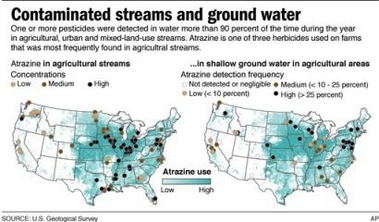|
Pesticides found in most US rivers, streams
(AP)
Updated: 2006-03-04 13:40
Most of U.S. rivers and streams 錕斤拷 and the fish in them 錕斤拷 are
contaminated with pesticides linked to cancer, birth defects and neurological
disorders, but not at levels that can harm humans.

Graphic shows
pesticide concentration and occcurrence.
[AP] |
Pesticides were found in almost all U.S. rivers and streams between 1992 and
2001, says a study released Friday by the U.S. Geological Survey, although most
drinking water supplies haven't been affected.
"While the use of pesticides has resulted in a wide range of benefits to
control weeds, insects and other pests, including increased food production and
reduction of insect-borne disease, their use also raises questions about
possible effects on the environment, including water quality," said Robert
Hirsch, the USGS associate director for water.
Pesticides were seldom found at concentrations likely to affect people, and
they were less common in groundwater. But they were found in most fish.
Most frequently detected in agricultural streams were three herbicides used
mainly on farms: atrazine, metolachlor and cyanazine. Just last week, the
Environmental Protection Agency settled a 2003 lawsuit brought by the Natural
Resources Defense Council, forcing the government to assess whether atrazine
threatens the survival of endangered Chesapeake Bay sea turtles, endangered
Texas salamanders and 16 other aquatic species.
Three other herbicides used commonly in cities 錕斤拷 simazine, prometon and
tebuthiuron 錕斤拷 showed up more often in urban streams.
The USGS looked for 100 pesticides, and found 40 of them had a widespread
presence in streams and sediment in both urban and agricultural areas, at
concentrations that could affect aquatic life or fish-eating wildlife. The
pesticides showed up more than 90 percent of the time in the fish tissue found
in agricultural, urban and mixed land-use areas.
In each of the streams the USGS studied, at least one pesticide was detected.
In about 19 of every 20 streams with agricultural, urban or mixed land-use
watersheds, pesticide compounds were found at nearly all times of the year. The
most frequent occurrence was in shallow groundwater beneath agricultural and
urban areas, where more than half the wells contained one or more pesticide
compounds.
Jay Feldman, executive director of Beyond Pesticides, a national research and
advocacy group, said the data surrounding the nation's reliance on about 1
billion pounds of pesticides a year "shows an urgent need to strengthen policies
at all levels of government and curtail pesticide use."
The USGS report is based on an analysis of data from 51 major river basins
and aquifer systems nationally, and a study of an aquifer system that runs
through eight states from South Dakota to Texas, east of the Rocky Mountains.
It found that concentrations of individual pesticides nearly always complied
with the EPA's drinking-water standards, though no water samples from streams
were taken at drinking-water intakes. The EPA also is responsible for reviewing
pesticides, based on pesticide-makers' tests that can cost tens of millions of
dollars. It typically takes up to a decade to study each one before it can reach
the marketplace, according to industry figures.
But simply detecting the presence of a pesticide does not always mean there
is reason for concern, said Jay Vroom, president of CropLife America, which
represents pesticide developers and manufacturers. He emphasized that the use of
pesticides by farmers, ranchers and others is strictly regulated by federal and
state laws.
"Water quality is of paramount importance to us," he said. "And the USGS
report correctly recognizes that the large majority of pesticide detections in
streams and groundwater were trace amounts, far below scientifically based
minimum levels set for protecting human health and the environment."
|